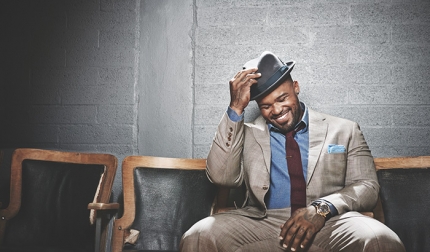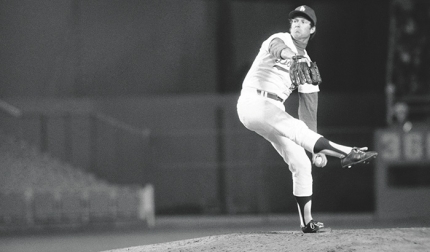In today’s culture, an elite athlete is expected to eat, drink, sleep and spend every waking moment thinking about his or her sport. If a team reports to camp on a certain date, your team should be at camp a day earlier, so the thinking goes. No one should ever outwork you. But with tunnel vision comes a lack of perspective. It’s that perspective to explore the culture that informs CJ Wilson’s life. “I try not to hold myself back,” he says. “I want to get the most out of my life. The richness of all my experiences translates back to baseball.”
It’s difficult to argue with the results. Wilson has improved steadily, first as a relief pitcher and now as a top-of-the-rotation starter. His 16-7 record with a 2.94 ERA earned Wilson his first All-Star appearance with the Texas Rangers, as the franchise came within a fingertip’s reach of winning the World Series last year. This off-season, as a free agent, Wilson signed a five-year deal with the Anaheim Angels to join Albert Pujols and begin the quest for a championship anew. And he gets to do it just a short distance from where he grew up in Newport Beach, CA. “Your whole life, you have a goal to be a star in the Major Leagues,” Wilson says. “But now, to be able to come home and pitch in front of your family and friends and live in the same place year-round, it’s amazing.”
It’s been a busy off-season for Wilson—a person who likes to stay busy. When he’s not pitching, he invests a great deal of time and energy into auto racing. “Before I had posters of athletes on my wall as a kid, I had pictures of cars,” he says. “But racing is a really expensive sport. Unless you came from a family of means, racing was a difficult sport to enter. I would play video games, take racing lessons, anything to be involved in the sport. I got hooked on everything about it—the science, the performance. I wanted to learn more and more.”
Wilson has brought his team-sport experience to CJ Wilson Racing, the professional race team he formed in 2010 to compete in several racing series around North America. “You need to create a culture,” he says. “It needs to extend through the pit crew. You can’t rely on the driver to do it all himself. You have to delegate a lot of things to other people. The one thing everyone can get behind is the urge to improve. When everyone has the same goals, you can get to a pretty high place. I’ve never had the opportunity to pick every member of my team before. It was one of the most fun experiences I’ve ever had.”
To Wilson, the similarities between racing and baseball are readily apparent if you look thoughtfully at both. “I believe in momentum,” he says, “the ability to improve in small ways both in pitching and on the track. It requires a long term focus over an entire season and a short term focus to lock in for three hours on your performance.” By being able to go back and forth between sports, Wilson is able to avoid the mental grind that can consume an athlete while steadily trying to improve in both worlds.
The combination of the two sports has allowed Wilson to keep a greater perspective in times of great stress. “When I have men on base, I can recall the time I crashed a car going at 130 miles and hour. Trying to throw a ball 95 miles an hour over the plate doesn’t seem nearly as stressful after that.”
Racing has also brought Wilson new supporters that remain unaware of his pitching exploits, as it has also converted some of his baseball fans to racing. He hears from all of them via a very active Twitter account that has over 100,000 followers. “It’s a nice number of people to have following you,” he says. “It’s still a high number, but I’m able to respond personally to more people. I don’t know how you can do that with a million people.”
The questions on Twitter range from amateur players asking for advice on Tommy John surgery recovery to whom he is dating. “The reality is that being a professional athlete gives you a platform,” Wilson says. “Ever since I was a kid, I imagined how great it would be to have that platform to help people. I had a chance to meet a lot of professional athletes as a young amateur player. Some guys were great to me. The guys that were jerks still stick out to me to this day. That experience has still stuck with me to this day. Twitter has been such a great tool to allow me to share a moment with people. I want to put forth only positive energy on it. It shouldn’t just benefit me, it should benefit everyone else as well.”
Wilson has also used his platform to create Wilson primarily gives back through his CJ Wilson’s Children’s Charities. He formed the foundation with a friend to help kids via education and health initiatives. “The best thing about my new contract is that it will now allow me to create an endowment to help kids. We can start getting to that level where we can transition into scholarships and helping build children’s hospitals. When you help save a child, the rest of his or her life is so long, and it’s such a bonus to society.”
In the meantime, Wilson will continue to encourage philanthropy by focusing the foundation’s events on more affordable opportunities for donors. “We love to do bowling events,” he says. “Our events are aimed at younger people. Maybe that 20-year-old kid is only contributing $20. But if he gets hooked on philanthropy, he’ll be giving for the rest of his life. We’ve even done Guitar Hero tournaments, which are way more fun than doing a big dinner. It’s all about creating that culture.”





